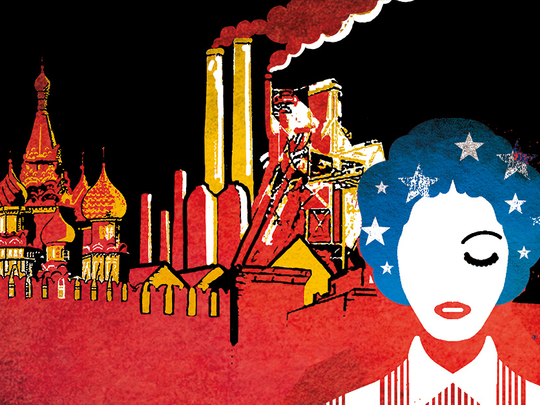
The Patriots
By Sana Krasikov, Spiegel & Grau, 550 pages, $18
Sana Krasikov wrote her debut novel before Donald Trump was elected, but in the current climate her themes are urgently relevant. The Patriots asks huge, complex questions about identity, loyalty, truth and self-deception, and explores tangled historical connections between Russia and the US.
Krasikov’s heroine, Florence Fein, trades 1930s Brooklyn for Soviet Magnitogorsk, a steel-producing city in the Urals. She is escaping the “whole rigged capitalist setup”, naively chasing both a utopian life of “meaning and consequence” and a dark-eyed Russian called Sergei. Seven decades later, Florence’s son Julian is trying to solve painful questions about his mother’s life: why, even after it killed her husband and imprisoned her for eight years, did she refuse to condemn the system that destroyed their family?
Commuting between Washington and Moscow, Julian designs icebreakers to extract oil from the Russian Arctic. His simultaneous attempts to extract his mother’s declassified file from “the still-warm bowels of the Soviet Union” are among the plot’s many metaphorical parallels. At the heart of this weighty and engaging novel are true stories: hundreds of Americans living in the USSR in the 1930s were abandoned by the US government and got trapped in Stalin’s terror.
Krasikov herself was born in Ukraine, grew up in Soviet Georgia, moved to New York in the 1980s and lives there today. Some of the characters’ experiences are based on things that happened to her family. Like Krasikov’s father, Julian is refused a PhD after years of research because the quota for Jews is full.
The Patriots contains elements of family saga, corporate thriller, historical novel and philosophical bildungsroman. Krasikov writes with a poetic ear for sound and cadence; Florence is variously compared to Odysseus, Cinderella and Dr Faustus, and there is a compelling momentum to her initially idealistic journey. In response to casual anti-semitism from their fellow passengers, her new shipboard friend, Essie, exclaims through humiliated tears: “And that’s what counts for loyal patriots these days, Florence! First-class American flag-waving bigots. That’s who’s in charge, and that’s why I’m through with the fine US of A.”
Krasikov puts the morality of patriotism squarely under the spotlight. Julian reads Eric Hoffer’s 1951 analysis of intolerant, fanatical mass movements, The True Believer, and recognises in it a portrait of his mother’s blind conviction. Hoffer’s book is one of many classics recently resurrected to throw light on to the darkness of Trump’s presidency. It examines the true believer’s ability to build a “fact-proof screen”. As Hoffer writes: “He cannot be frightened by danger nor disheartened by obstacle nor baffled by contradictions because he denies their existence.”
Similar themes recur throughout Krasikov’s work. “They justified their deceit by convincing themselves that the truth — if you took a close enough look at it — was no different from the lie,” observes Lera in The Repatriates, a short story from her 2008 collection One More Year. The narrative scope of Krasikov’s first book, brilliantly sketching the deracinated lives and loves of post-Soviet migrants, showed her potential as a novelist. The 560 pages of The Patriots give her characters more time to trace the interplay between past and present.
The book’s chronology is deliberately erratic at first: skipping from 1956 to 1934, 2008 to 1932, like a hypnotic temporal yo-yo. Gradually the well-crafted plotlines converge with confidence. Julian’s corporate entanglements in near-contemporary Moscow and his mother’s horrifying story, starting seven decades earlier, significantly echo each other.
The novel’s deft navigation of history’s reverberations and divergences provides new maps of the past. Roosevelt’s obligingly bovine ambassador to the USSR, Joseph Davies, seems to have sat through show trials “with the same illiterate appreciation” as Bolshoi operas.
Krasikov’s portraits of Moscow, past and present, are evocative and convincing. The city’s drifting poplar seeds and stray dogs, trams and tower blocks link the two narratives.
Two adjacent chapters, separated by 74 years, are set in the Metropol Hotel, with its high stained-glass ceiling. Visiting his rebellious son Lenny, who is trying to make his way in Moscow, Julian walks between gleaming mansions with security cameras and faded log cabins, between “paranoid New Russia” and the “decomposing Soviet Union”.
But there are also metaphysical connections: both strands examine the corrosive pressures on morality. Julian’s story is sometimes reminiscent of A.D. Miller’s Booker-shortlisted Snowdrops, another tale of corruption and complicity set in modern-day Moscow, with its steamy, birch-whipped banyas, drunken barbecues at the dacha and greedy, compromised expats. There is a similarly authentic sense of danger, but Krasikov tempers the grimness with redemptive compassion. The most moving strands of her novel explore the agonisingly difficult relationships between parents and children and the fact that, as one character comments, “there’s not enough kindness in our world”. However bleak the outlook, political morality is ultimately about human beings and the way we treat each other.
–Guardian News & Media Ltd









